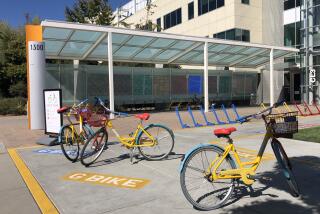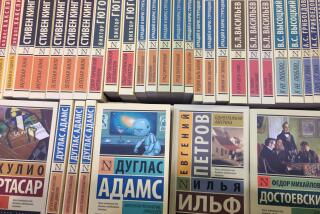Career-Minded in Russia Hit the Books to Get Ahead
- Share via
MOSCOW — When Oleg Podobryansky was a teenager, his dream was to become a top Soviet scientist, doing research that would expand the frontiers of Soviet knowledge to undreamed-of places.
But Podobryansky graduated with a doctorate in biochemistry in 1991, the year his Soviet Union and its dreams fell apart. The once-lofty state science institutes were too broke to hire him.
So he left the world of science. To make enough money to survive under capitalism, he started trading consumer goods. He set up a small firm. He married. He prospered. But he kept hankering for knowledge.
Last year, at age 33, Podobryansky went back to school. This time around, he’s chosen a major that fits his present way of life as a well-off businessman and father living in a city whose brand of capitalism has become relatively stable. He’s getting his master’s degree in economic theory.
Podobryansky’s trajectory shows the changes that have taken place in higher education in Russia this decade as young people growing up with radically different lifestyles and expectations from those of their parents--and of their own childhoods--train, or retrain, for the future.
“There was a long phase where students dropped out of school altogether and went off to trade on the street instead. But that’s over now. Kids know they need to equip themselves properly for the job market these days. And they’re flocking back to educate themselves,” said Alla Tilinina, deputy dean of the baccalaureate department of the Higher School of Economics, founded after the Soviet collapse.
“It’s very useful,” the trimly bearded Podobryansky said of his new studies at the Higher School of Economics. “What I need now is some theory, as well as some new management techniques, to help me at work.”
He has no regrets about the past and no intention of making a career in the academic world. But he’s glad to be back in class--to him, it symbolizes the end of the uncertainty of those early post-Soviet days, when learning suddenly meant nothing, and life briefly became a brutal matter of dog eat dog.
Different Subjects Popular in Soviet Days
In earlier times, during the settled years of Soviet stagnation--as recently as 1980--more than two-thirds of students at college were learning the rugged professions that the Soviet system glamorized--engineering, medicine, agriculture and many branches of pure and applied scientific research for civilian or, more often, military purposes.
The macho daydream of Soviet science students was to become a cosmonaut. More realistically, they could be confident that good exam results would land them prestigious, well-paid work in a huge state institution. In a nation whose self-image was of a giant, smoothly functioning machine, almost 50% of all college students were future engineers.
Then came the first period of change. Polls from the despairing, uncertain perestroika years at the end of the 1980s were notorious for showing that schoolchildren thought their best employment hope for the future was a career as a butcher, taxi driver, street trader or hard-currency prostitute. The number of students in higher education dropped sharply as thousands took the same route as Podobryansky. Parents wrung their hands in despair at the idea that education was going out of style.
Now another change has come as the first generation of post-Soviet high school students figures out the best way of getting ahead in the new world. These days, the magnetic pull of the giant machine has weakened, and the attractions of entrepreneurship have grown stronger. Kids growing up in a world of television ads for every imaginable luxury want access to the new wealth, but they also want the best of the new qualifications. The more discerning students of today want their minds stretched as much as their wallets.
“I’m not going to be an academic; I want a career in the private sector later, in a company or a bank,” said Katya Pkhaladze, 19, a cheerful economics student embarking on the grueling, 44-hour-a-week undergraduate course at the Higher School of Economics. But she thought she might first complete not only her four-year undergraduate studies but go on to earn a two-year master’s degree, and she had shopped carefully around the top institutes for the best program before taking entrance exams to her school.
The choices college students are making may not be quite what their parents had planned for them 10 years ago, but they once again reflect an attachment to formal education that parents can at least respect.
Valery Karpov, 45, wanted his oldest daughter, Natasha, to be a linguist. He started teaching her English and French when she was just 5 and dreamed that she would one day have the prestigious job of teaching literature at Leningrad State University.
Natasha got as far as the second year of her five-year university course. Then she thought again. It was 1992: Half her friends had left to make money--the more intelligent half, she said. She got a part-time job as manager of a business center at a hotel in Leningrad, now renamed St. Petersburg, but carried on studying part time. Meanwhile, dubious job offers poured in.
“We were so worried all the time,” Valery Karpov recalled. “Natasha would come home saying she’d been offered this job or that job, all with fly-by-night new private firms; there’d be phone calls late at night from men with rough accents. It seemed like her only future was in some kind of mafia.”
Father Seeks Help From Alabama Friends
After a year of this, Natasha’s father asked his foreign scientist friends in faraway Alabama to help her get a place at an American college. She dropped her language studies and began studying business in the United States. Next year, with qualifications in marketing, accountancy and other modern skills, she plans to come back to Russia to look for a job. She is fluent in English, but she won’t be trying to teach literature. Natasha wants to become a tycoon.
“It’s not at all what we expected for her. But it’s a real relief that--in spite of all this turmoil--she has good qualifications, has finished college and will have a proper professional job to go to,” her father said.
Last year, 14-year-old high school students in Moscow were polled by the Vtsiom opinion survey agency about career and study aspirations. A majority said they wanted to go into business, but as top-flight professionals: 21% as economists or accountants, 20% as lawyers, 18% as financiers and 14% as entrepreneurs.
Less popular, with roughly 2% of children opting for each, were the jobs of politician, journalist, computer operator, doctor, diplomat, bank teller, model, car salesman, translator and hairdresser. Only 2% opted for the dark side of new Russian life, saying they wanted to be mafiosi or professional killers. And 1% wanted to become prostitutes.
No one wanted to be an engineer or a cosmonaut.
Education Ministry figures show the same shift in priorities among students who enrolled in college last year. Less than a quarter of college students today are now learning engineering; instead, a quarter of them are learning the hot new subject, economics, up from the 10% who enrolled in Soviet economics courses in the 1980s. Language studies are up too, and trendy disciplines such as environmental studies have appeared for the first time.
Spruced-Up Courses and New Colleges
Old universities and institutes are sprucing up their courses, and new colleges are opening to cope with the demand. A religious university of 450 students has started up in Moscow. As one might expect, it offers courses on subjects relating to Russian Orthodox Church history and culture to young people who want to get back in touch with traditions lost during the Soviet era. But it also offers courses in ecology, law and economics, “with a necessary infusion of morality,” as founder Father Ioann Ekonomtsev says. A similar college exists in St. Petersburg.
But economics studies are the biggest crowd-pullers. The high-profile Higher School of Economics and the New Economic School, both in Moscow, were founded in the early 1990s as a way to spread Western-style economic thinking in the Russian academic community. The schools’ founders wanted to train a new generation of economists to teach Western methods, and to provide a labor pool of trained experts for work in ministries and private firms.
The Higher School of Economics offers degrees in economics, law, management, sociology and finance. It gets government financing for the best 200 of its approximately 400 students. Others pay fees of about $100 a month.
Dozens of other economic and business schools are advertised in newspapers and in the subway. New colleges must pass muster with the Education Ministry to be accredited as places of learning; after that, they must fight a second battle, to win state funding from the national budget or find sponsors.
The total number of college students is rising again too, from 583,000 in 1990 to 748,000 last year. But, in a country of 150 million people, this is still a tiny minority--mostly the children of a city-bred elite.
“We’re trying to make our education more accessible to more people,” said Yaroslav Kuzminov, chancellor of the Higher School of Economics, which advertises its courses on big billboards on the streets outside every faculty building. “But higher education is still very elitist. You tend to get the children of the powerful, not the man on the street, coming in. I think that’s something that could cause problems in the future unless we change it.”
Keeping the Science Option Open
The bright-eyed students thronging the corridors of the Higher School of Economics mainly studied math and physics in high school. Most are also the children of scientists and professionals in the old Soviet mold.
“I was always a techie, good at math, but didn’t want to do arts subjects,” said Kostya Arshakuni, 19. “But math is a good roof over your head. It’s turned out to be the perfect basis for my economics now.”
But some of the students regret that the old days--when working in science was regarded as the most prestigious career choice--have passed.
One, 18-year-old Sveta Savicheva, said she sometimes yearns for further study of math and physics. Although Sveta, a pixie-faced girl with long blondish hair, is glad to be learning economics, she has joined an evening “science circle” of students who want to keep their options open by continuing their studies in math and physics. This extra study will let students like Sveta write doctoral dissertations after they graduate as economists--if they decide, after all, that science is their real love.
“You need a technical education of some sort,” Sveta said. “Once you’ve got that, you’ve got your road through life mapped out. I opted for economics because it’s practical and marketable, but I’m a bit sorry to have given up science and want to keep the door open.”
In a sign that the educational revolution is coming full circle, math and physics professors are saying, hopefully, that more students are beginning to enroll in their abstract courses again.
“The number of kids studying natural science at university dropped a lot, but it’s going up again now,” said Semyon Musher, who teaches physics at Novosibirsk University. “People are starting to value our basic science, because it’s good. Even if you don’t become a scientist later, your brain is trained, and you have a good mathematical basis for working in other fields.”
More to Read
Sign up for Essential California
The most important California stories and recommendations in your inbox every morning.
You may occasionally receive promotional content from the Los Angeles Times.













